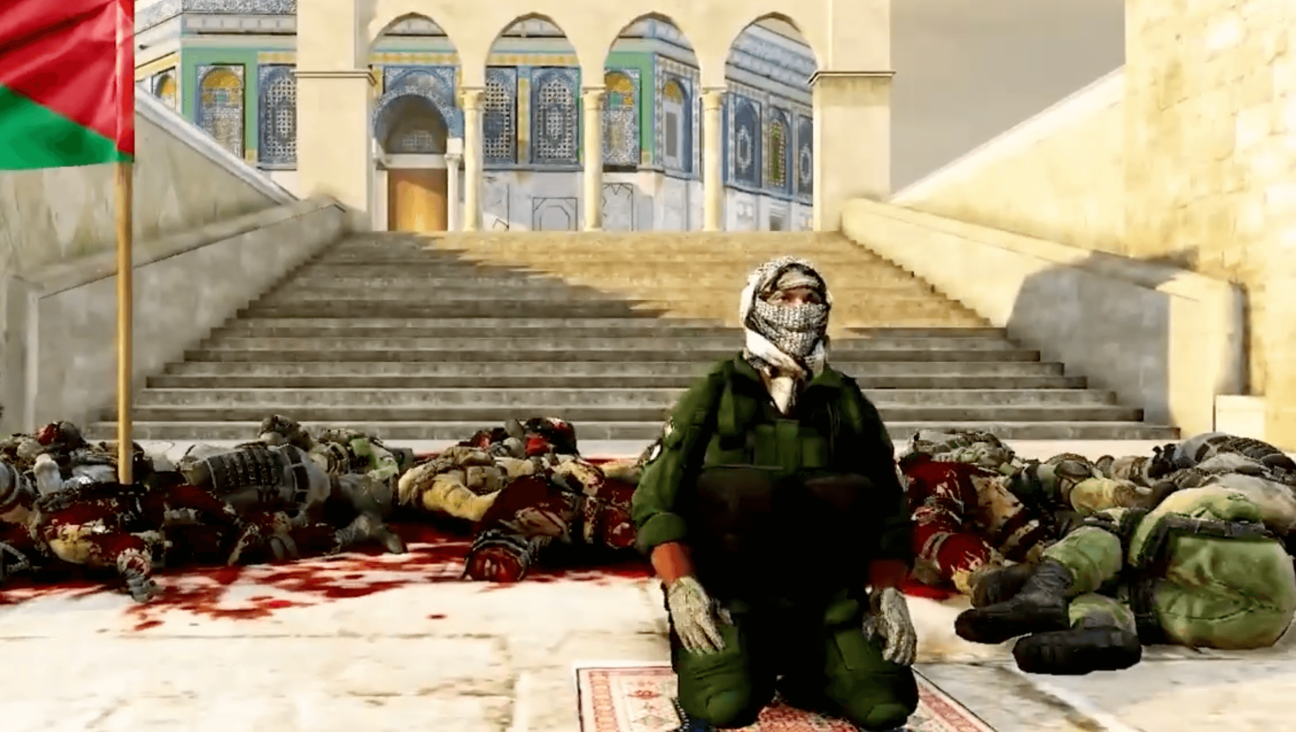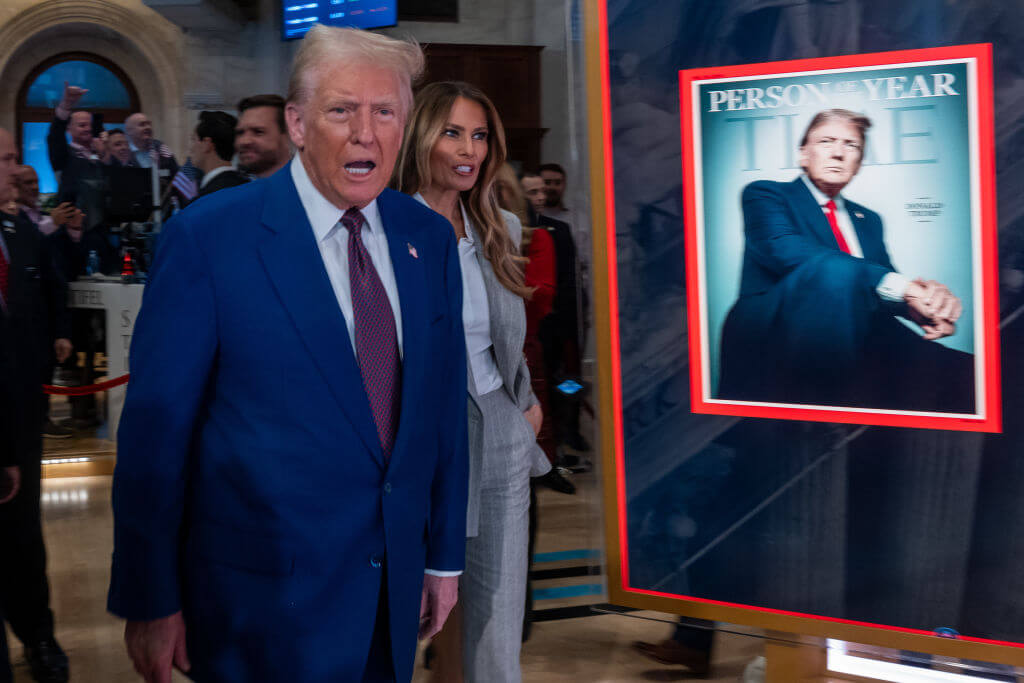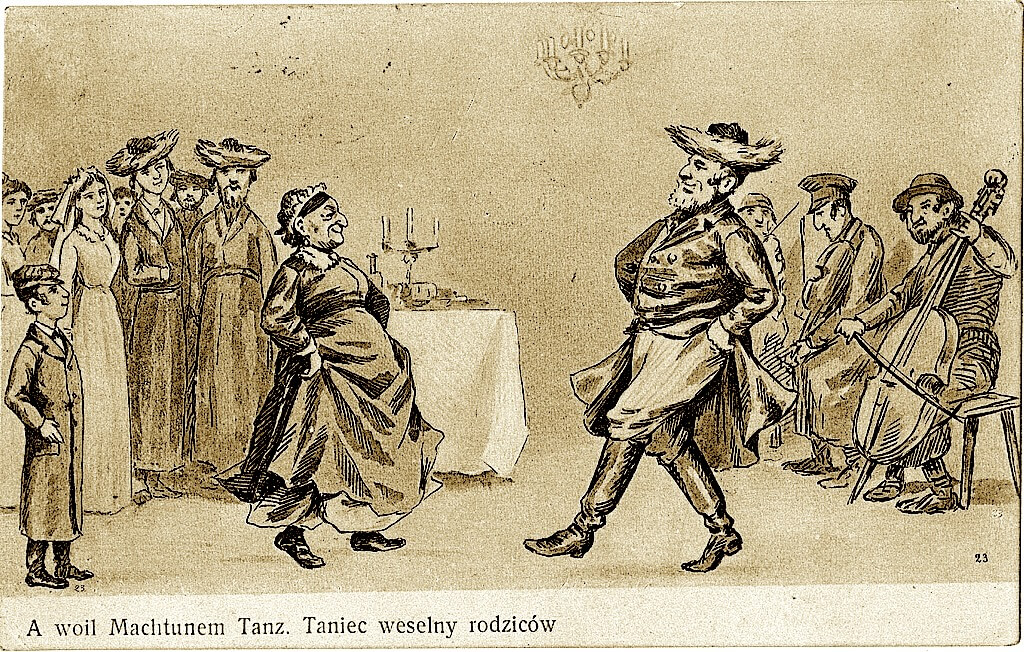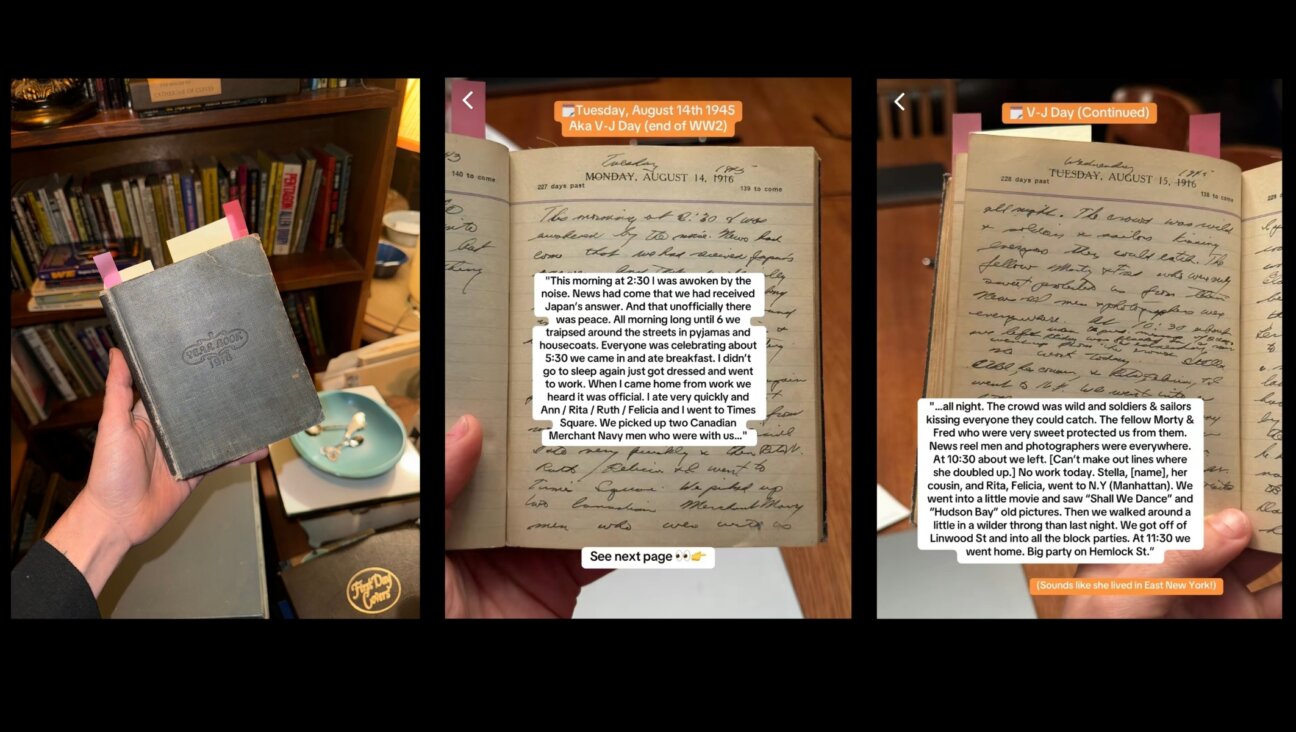Why Do Genesis Prize Oligarchs Keep Popping Up In Trump’s Russia Scandal?

Image by Getty Images
Few plotlines could be more embarrassing to a gaggle of Russian Jewish billionaires than this: Create a million-dollar “Jewish genius” prize, elegantly named The Genesis Prize. Award it to an A-list movie idol like Natalie Portman. Then find out that she’s boycotting the award ceremony in Jerusalem as a headline-grabbing protest of Israeli politics — and, to top it off, the prize will still go mainly to the liberal charities she recommended.
As embarrassing as that sounds, it probably won’t be the worst thing that happens this year to the three Russian billionaires behind the prize, Mikhail Fridman, Petr Aven and German Khan. Kremlin-linked oligarchs with a prodigious record of Jewish philanthropy, their names have lately been popping up repeatedly in strange, disparate, “Where’s Waldo”-style corners of the Trump-Russia affair.
As yet, the sightings are too scattered and random to suggest a coherent narrative, but too numerous to be ignored. Give what’s surfaced so far, it seems likely that special counsel Robert Mueller will get around to the founders of the Genesis Prize, perhaps sooner rather than later, with some queries a tad more awkward than merely explaining Portman’s exodus from their Genesis.
Sighting No. 1: Alfa In The Steele Dossier
The philanthropic trio’s business partnership, Alfa Group, a sprawling oil-banking-telecommunications-retail conglomerate, has its own special chapter in the infamous Steele dossier. More precisely, one of the 17 memos that make up the dossier is a description of a seamy adviser-bagman relationship allegedly maintained by Fridman, Khan and Aven with Russian President Vladimir Putin, along with an intriguing hint that Fridman has become a key adviser to Putin on American affairs.
Strangely, the Alfa memo is the only one of the 17 in the dossier that has no visible connection to the Trump campaign. The other 16 memos add up to a rough sort of narrative of alleged Trump-Russia interactions. The Alfa memo, No. 12 in the series, sticks out like a sore thumb. And yet the dossier’s author, the respected British ex-spy Christopher Steele, saw fit to include it with the rest. While his reasons remain obscure, it’s safe to assume that he had reasons.
Steele, a former Russia expert with Britain’s MI6 intelligence agency, had been hired by the American research firm Fusion GPS in 2016 to investigate Trump’s business dealings with Russia. Fusion GPS had been contracted by an anti-Trump Republican group, but after Trump clinched the GOP nomination, Fusion’s contract was picked up by Hillary Clinton’s Democrats.
It’s important to note that Fridman and Aven deny all alleged Putin links and have filed defamation lawsuits against Fusion GPS, which hired Steele, and against BuzzFeed, which first published the dossier. Also important: Some of the dossier’s key assertions have been corroborated by the FBI and others; none have been disproved.
Sighting No. 2: The Ukraine Oil Link To Stormy Daniels and Michael Cohen
The Alfa Group had a decade-long, multibillion-dollar oil partnership with Viktor Vekselberg, the Russian oligarch who allegedly paid $500,000 into a shell corporation set up by Trump lawyer-fixer Michael Cohen — the same shell corporation Cohen used to pay off the porn actress known as Stormy Daniels.
Alfa joined forces with Vekselberg and his longtime friend and ally Len Blavatnik in a strategic oil alliance in 2003, combining their separate interests into a single firm, known as AAR (after Alfa, Blavatnik’s Access Industries and Vekselberg’s Renova Group). AAR then entered a 50-50 partnership with the British oil giant BP to form TNK-BP, Russia’s third-largest oil company.
A decade later, in 2013, TNK-BP was bought by Russia’s largest oil company, the government-owned Rosneft, for a staggering $56 billion, including $40 billion in cash — all of it borrowed — and the remainder in BP shares of Rosneft stock. The deal made Vekselberg the richest man in Russia. Fridman and Khan, the main Alfa partners, weren’t far behind. Blavatnik also benefited — he lives in Britain, where he is now said to be the realm’s richest citizen.
Vekselberg, for his part, is one of the seven Russian oligarchs sanctioned this past April by the Trump administration, in a delayed and grudging response to Russia’s 2016 election meddling. The sanctions are reported to have frozen some $1.5 billion to $2 billion in Vekselberg’s dollar-based accounts, about a tenth of his reported total worth.
To understand what happened next, after Rosneft bought TNK-BP, you need to know what happened before it. Two years earlier, in January 2011, Rosneft had signed a multibillion-dollar deal with BP — which was still reeling from its Gulf of Mexico disaster the year before — to search for oil in the Arctic Ocean, off Russia’s north coast.
The Rosneft-BP deal quickly collapsed, however, after the AAR oligarchs sued in an international court, claiming the deal violated BP’s partnership with them. Rosneft quickly concluded a new Arctic exploration deal, replacing BP with the American oil giant Exxon Mobil. The deal was sealed in June 2012 signing ceremony, attended by Exxon CEO Rex Tillerson and Russian President Vladimir Putin, at a Russian Black Sea resort not far from the Ukrainian province of Crimea, of which more later.
The closing of the Exxon deal was a feather in the cap of Rosneft’s newly appointed CEO, Igor Sechin, an intelligence veteran and one of Putin’s closest lieutenants. Sechin further burnished his reputation a year later with the massive 2013 TNK-BP purchase, which made Rosneft the world’s biggest publicly-traded oil company — and most heavily debt-burdened.
Within months of that deal, Sechin’s world began to collapse. The troubles, initially unrelated to our story, began in November in neighboring Ukraine. Ukrainian President Viktor Yanukovych, a Putin ally, decided to tear up a pending energy, aid and friendship agreement with the European Union and instead accept a big economic rescue package from Moscow. The decision sparked protests among Ukrainian nationalists hoping to break their country’s long subservience to Moscow and align with the Western democracies. The protests quickly turned against Yanukovych himself for his appalling human-rights record and epic-level corruption.
On February 22, 2014, with a population in open revolt, Yanukovych fled to exile in Russia, hours before Ukraine’s parliament deposed him. Putin, fearful of losing Ukraine, promptly moved troops to the border, alongside Ukraine’s Russian-speaking eastern provinces. He also began steps to take over and annex Crimea, a strategic Ukrainian region with a mostly ethnic Russian population. In July, after months of tension, the Obama administration retaliated for Putin’s aggression by slapping economic sanctions on Russia, including a crippling ban on business dealings with Rosneft.
The American sanctions froze Rosneft’s critical Exxon Mobil deal. The Russian oil behemoth was left with crushing debt from its TNK-Fridman-Vekselberg buyout and few prospects for rescue. Sechin, Putin’s close confidante, was left in command of a floundering Titanic. And the drama’s biggest winners, particularly Fridman and his Alfa allies, had become key influentials in Putin’s inner circle — even to the point, if Steele is to be believed, that Putin was willing to overlook their failure to plow their Rosneft earnings back into the Russian economy, a cardinal sin in Putin’s worldview.
Sechin, for his part, is depicted as playing an important role in initiating contact with the Trump campaign, particularly in a July 2016 meeting in Moscow with campaign adviser Carter Page. The meeting is described in the Steele dossier and was confirmed by Page in November 2017 testimony before the House Intelligence Committee.
Sighting No. 3: The Manafort And Khan Connection, And Indictments
This past April 3, the Mueller investigation into Russian election interference won its first prison sentence: a 30-day term for London-based lawyer Chris van der Zwaan. He reported to prison May 8. By the most extraordinary of coincidences, van der Zwaan is the son-in-law of Alfa principal German Khan.
Van der Zwaan had pleaded guilty in February to lying to Mueller’s investigators about his contacts with Rick Gates, top lieutenant to Paul Manafort. The contacts occurred while Gates and Manafort were working as consultants to Yanukovych, then still Ukrainian president. Gates would later follow Manafort to the Donald Trump presidential campaign, serving as deputy campaign manager, and eventually became deputy chairman of the Trump inaugural committee. He received one of Mueller’s first indictments.
Van der Zwaan’s contact with Gates concerned a report that his law firm, the New York-based Skadden Arps, was conducting for Yanukovych’s justice ministry. Skadden had been hired in 2012 to review the trial and sentencing of Yanukovych’s political rival, the pro-EU former prime minister Yulia Tymoshenko. The case was criticized internationally as a political frame-up — an early case of “lock her up,” so to speak. Van der Zwaan was on the Skadden team reviewing the trial. Not surprisingly, they found the proceedings credible and fair. The firm was paid about $1 million for the work, though half was later returned. Manafort is suspected of funneling another $4 million from his offshore accounts to Skadden and other firms.
The Sum Of The Parts
What does all of this add up to? Like the Mueller probe itself, our oligarch sightings can be seen as a series of random, unrelated events, linked only by coincidence. Indeed, even Mueller’s defenders have a hard time linking the various findings that surface, whether as rumor, press report or legal filing.
The fog surrounding the case has spawned a cottage industry of theories as to what might connect the wildly disparate dots and explain the larger, underlying plot, if there is one. Among the most popular theories: a Russian bid for influence in a future Trump-led Washington; a quest for deals to end U.S. sanctions on Russia; or a grand strategy to undermine Western democracy.
The theories are all plausible, and they don’t necessarily exclude one another — though they mostly seem like a small return for the effort, resources and risk involved.
There’s another possible explanation for the Russian actions. It’s one that accords with Russia’s history and illustrates the urgency of the events. It’s simply this: Putin is terrified of losing Ukraine. The neighboring state to Russia’s south is not really a neighboring state. It’s the birthplace of Russian identity. It’s Russia’s soft underbelly. It’s Russia’s access to warm-water ports.
For Ukraine to spurn Russia and join the Western alliance would be like Canada suddenly allying itself with Iran or North Korea. It’s enough to remember America’s six-decade nervous breakdown over tiny Cuba going communist. Imagine if the American response to Cuba’s revolution triggered a wave of international retaliation and disastrous economic sanctions against America.
Not to put too fine a point on it, but the fight has particularly strong resonance for Jews. Ukraine has a special place in Jewish history and imagination. Ukraine was for centuries home to one of the world’s largest and most creative Jewish communities. It’s the birthplace of the Baal Shem Tov and Hasidism and the burial place of Rabbi Nachman, the place where Sholem Aleichem placed Tevye’s beloved Anatevka, the place where the seminal ideas of Jewish modernity — of Zionism, socialism, Yiddish and Hebrew literature — first took root and blossomed.
Ukraine was also a place where relations between Jews and non-Jews were almost uniquely fragile. Ukraine’s best loved national heroes, particularly Bogdan Khmelnytsky and Semion Petliura, are remembered as among the greatest villains of Diaspora Jewish history, each leading a doomed national uprising that left tens of thousands of Jews murdered by mobs. The Cossacks, Ukraine’s favorite folk heroes, equivalent to America’s cowboys or England’s knights-in-armor, are still a synonym in the Jewish mind for mass murderers on horseback.
It shouldn’t be surprising, then, that Ukrainian Jews figure prominently in Putin’s struggle. For much of the past century, while Ukrainian nationalists have viewed Russia as the great bully to the north, many Ukainian Jews looked to Russia as a protector from their neighbors.
The four oligarchs most closely identified with Rosneft’s turmoil, Fridman, Khan, Vekselberg and Blavatnik, were all born and raised in Ukraine but built their future in Russia. All four moved to Moscow after high school to attend technical colleges of metallurgy and railway engineering, where their lifelong friendships and partnerships were born. At least some of the future moguls’ college choices were dictated by Soviet-era obstacles to Jews’ university admissions, as Fridman said of himself in a 2015 speech.
It’s too soon to say whether Fridman, Khan and company, pillars of Jewish community life and serious global Jewish leaders, will yet be implicated in Putin’s scheming or subject to American justice, or vengeance. Right now there are only hints here and there that have no obvious connection to one another. There’s much that remains hidden below the surface, though. The patrons of the Genesis Prize may have much more to fear than rebellious film stars. On the other hand, it’s equally possible that, as the Steele dossier hints, they could end up being Moscow’s essential voices of reason.
After all, the very first bit of evidence that Russia was influencing the 2016 campaign, and for months the only evidence, was the softening at Trump’s behest of a platform plank urging military aid to pro-Western Ukrainians. At the time it seemed a laughably weak pretext for such a forceful national uproar. With what we know now, it shouldn’t seem so weak, and we shouldn’t be laughing. If this is a struggle over Russia’s stake in Ukraine’s future, Americans have a serious fight on our hands.
J.J. Goldberg is editor-at-large of the Forward, where he served as editor in chief for seven years (2000-2007). Contact him at [email protected] or on Twitter @jj_goldberg
A message from our Publisher & CEO Rachel Fishman Feddersen

I hope you appreciated this article. Before you go, I’d like to ask you to please support the Forward’s award-winning, nonprofit journalism during this critical time.
We’ve set a goal to raise $260,000 by December 31. That’s an ambitious goal, but one that will give us the resources we need to invest in the high quality news, opinion, analysis and cultural coverage that isn’t available anywhere else.
If you feel inspired to make an impact, now is the time to give something back. Join us as a member at your most generous level.
— Rachel Fishman Feddersen, Publisher and CEO























